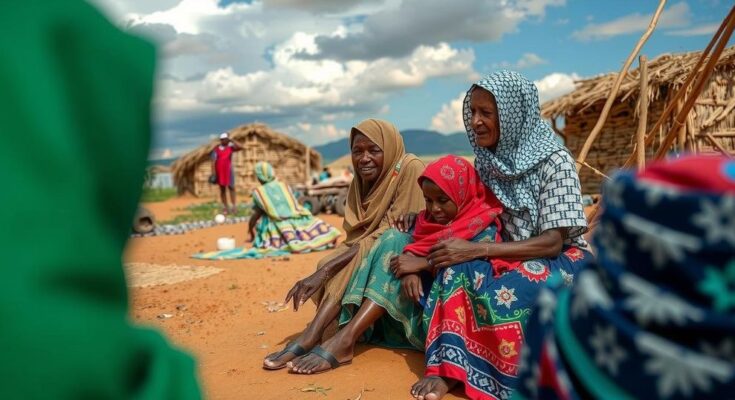A new EJF report reveals that Somali climate refugees in Dadaab are facing a surge in displacement caused by floods and ongoing droughts. The number of people in the camp has increased substantially, reflecting a broader trend of climate-induced migration. With severe food insecurity affecting millions in the Horn of Africa, immediate international action is deemed necessary to address the crisis and provide protection for climate refugees.
The Environmental Justice Foundation (EJF) has published a grave report highlighting a surge in climate refugees at the Dadaab Refugee Camp in Kenya, spurred by escalating climate disasters in the Horn of Africa. In 2024, extensive flooding displaced thousands, exasperating the pre-existing crisis caused by years of drought and conflict which had already led to significant migrations. The report reflects on the sobering reality that climate-induced displacement has intensified, with 32.6 million people displaced globally in 2022, a sharp rise from 23.6 million in previous years. Dadaab was originally designed to house 90,000 people, mainly Somali refugees fleeing the civil war from 1991. However, the current population has surged to over 320,000 due to a combination of drought and conflict, exacerbating living conditions described by refugees as akin to an “open-air prison.” Furthermore, the report details the coalition of social injustices faced by those least responsible for climate change. For instance, Somalia’s carbon footprint is significantly lower than that of developed nations, yet its people are bearing the brunt of climate disasters stemming from global warming. The recent influx in Dadaab includes tragic testimonies of displaced families; many recount devastating losses in livestock, which are a substantial part of their livelihoods. As food insecurity rises, approximately 23.5 million people were identified as suffering from acute food insecurity during the peak drought period in May 2023. This exacerbated the suffering in a region where children are disproportionately affected, resulting in thousands of deaths due to malnutrition. Despite the daunting circumstances, EJF’s findings emphasize the urgent need for international support and intervention. Steve Trent, EJF’s CEO and Founder, argues that the enduring suffering caused by the climate crisis is a consequence of selective choices by leaders prioritizing profit over human welfare. Citing the necessity for augmenting international frameworks to include climate refugees protection, he urges for a decisive global approach to combat the worsening crisis. The testimonies gathered reflect a dire plea from individuals who have lost everything, emphasizing the injustice faced by those contributing the least to environmental degradation. The report implores the international community to acknowledge the responsibility of wealthier nations toward climate impacts on vulnerable populations, positing that climate justice is paramount to ensuring a humane and equitable future for all. Conclusively, the EJF’s report underlines the escalating reality of climate-induced displacement, particularly in the Horn of Africa, and calls for immediate and concerted efforts from the global community to address these severe challenges, in alignment with the principles of justice and compassion for those affected.
The increased frequency and intensity of climate-related events are creating substantial challenges globally, particularly in regions like the Horn of Africa. The recent EJF report underscores the alarming link between climate change and the rise of climate refugees, showcasing firsthand accounts of the struggles faced by those enduring the effects of global heating. This situation is worsened by the continued neglect of affected communities by global leaders, further complicating their plight.
In summary, the situation in the Dadaab Refugee Camp highlights the severe impacts of climate change on vulnerable populations, particularly those who contribute the least to global emissions. The findings of the EJF report emphasize the urgent need for action from the international community to protect climate refugees and mitigate the devastating effects of climate disasters. With voices from the refugees themselves urging for intervention, it is clear that a united global response is essential for addressing this ongoing crisis.
Original Source: ejfoundation.org




